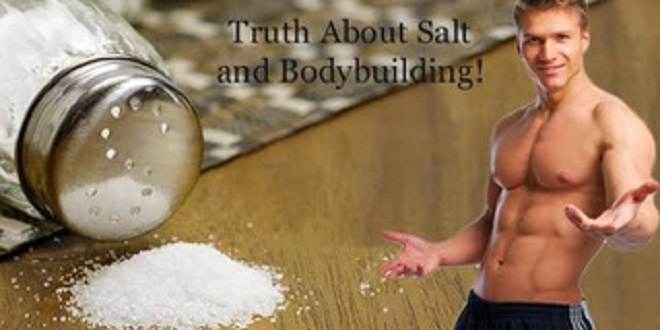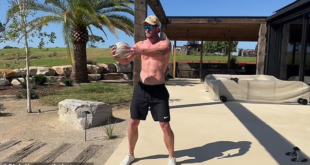When you are an athlete or aspiring to be one, you become highly dedicated but also overly cautious. Monitoring your exercise routine and diet pattern is extremely essential, but most of us do not do it in the right way. We end up taking advice from unreliable sources which draw their references from preconceived notions and half-baked researches. One such notion is that salt or table salt is the bad guy of the food world and should be avoided. Should bodybuilders who need to endorse a certain level of muscularity should refrain from salt or rather sodium? Does sodium have a negative impact on muscles? Let’s demystify common salt today.
Salt and Bodybuilding
A lot of bodybuilders religiously cut down on the salt i.e. sodium intake in order to avoid water retention and get lean. A lot of dietitians and bodybuilders have come forward to end this myth. Firstly, sodium intake will not lead to extensive water retention if you also increase your water intake. In less than a week your body will strike a balance with your new sodium intake and water. Also, experts say that some water retention in the muscles is good when you are trying to achieve more muscles.
How salt or sodium intake helps bodybuilders?
- Salt i.e. sodium is essential to maintain the level of body fluids which make the muscles look hard and big.
- It has been seen that protein uptake and turnover is better when the level of fluids in the body is a little higher. And we all know what role protein plays in cellular growth.
- Sodium also increases the body fluids which increases the load lifting potential during workouts.
- It has also been seen that increased levels of fluids in the body act as cushions and lubricants thereby reducing the chances of injuries and muscle strains.
- Adequate body fluid is required for proper functioning, repair and growth of cells
- Certain amino acids are able to enter the cells only when escorted by sodium molecules
What happens when you go on a low salt diet?
- Low salt i.e. sodium in the body activates aldosterone. It is a hormone that plays a crucial role in regulation of sodium and potassium levels as well as blood pressure.
- Aldosterone starts retaining sodium and excreting potassium through urine. It requires more water to excrete out potassium and hence, there is significant water loss.
- The body fluids gets depleted which can affect blood pressure.
- These conditions further activate Vasopressin, a hormone that tries to retain water when the body fluid levels start decreasing
A little about salt
By salt here, we mean the common salt or table salt. It is made up of two elements Sodium (40% of salt) and Chlorine. Both cannot be produced by the body naturally and hence need to supplied through a balanced diet. At times you will see that salt and sodium are used interchangeably because we usually are talking about sodium when we talk about salt.
Sodium is a very important electrolyte in the body and plays a crucial role in many bodily functions like muscle contraction, nerve function, metabolic processes, blood volume, blood pressure, intra and intercellular fluids etc. Along with Potassium (another crucial electrolyte), sodium makes the Potassium-Sodium Ion Pump. As sodium and potassium move in and out of the cell, the difference in potential allows the muscles to contract and relax thus inducing movements, heart beats, secretions, neuro transmissions etc. They also play a crucial role in urine formation and fluid retention within the body. So we can say for sure that sodium is not bad. It is definitely needed by the body and by completely avoiding salt you could be subjecting yourself to certain health risks.
Another important thing that needs to be noted here is that sodium alone is not important. Sodium shows its heroic side in conjugation with potassium.
Sodium and Potassium Intake
Now, we don’t mean you should start adding sodium to everything you eat. Sodium intake should not be more than 2.3 grams. This equals to around 4 grams of salt. Athletes with moderate workouts need not increase sodium intake after workout as sweat is generally just 1% sodium and 99% water. The requirement can be a little more (up to 6 grams of salt) for hard core athletes who indulge in exhausting long term workouts and sweat a lot. These athletes may lose a lot of sodium through sweat and hence, should replenish it.
Closing words
- Focus on having sodium and potassium from natural resources like fruits and vegetables. Include 3 to 4 servings of fruits and leafy vegetables to get the right amounts of sodium and potassium.
- Adding more salt to the food can be an option but that would provide only sodium and you would still lack on potassium. So either go for salts that are fortified with potassium or stick to natural foods.
- Labelled foods will definitely show the amount of sodium in it but they do not by large reveal the potassium content. Hence, choose carefully.
- Avoid fluctuations. Most damage is done when you subject your body to sudden increase or depletion of sodium. It completely disrupts the body’s homeostasis. Be consistent in your approach. If you want to increase or decrease your sodium levels, do so gradually so that your body gets enough time to get used to it.
This is what the true science behind sodium intake is. Please note that the reasoning will do good when you are in a healthy state of body. If you are already suffering from conditions like compromised kidney functions, existing hypertension then get in touch with your physician before you plan to alter your sodium intake.
 IBB – Indian Bodybuilding IBB – Home of Indian Bodybuilding and Fitness
IBB – Indian Bodybuilding IBB – Home of Indian Bodybuilding and Fitness






